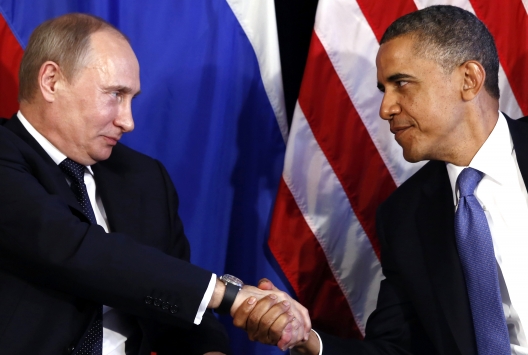 The United States has concluded that Russia violated a landmark arms control treaty by testing a prohibited ground-launched cruise missile , according to senior American officials, a finding that was conveyed by President Obama to President Vladimir V. Putin of Russia in a letter on Monday.
The United States has concluded that Russia violated a landmark arms control treaty by testing a prohibited ground-launched cruise missile , according to senior American officials, a finding that was conveyed by President Obama to President Vladimir V. Putin of Russia in a letter on Monday.
Russia first began testing the cruise missiles as early as 2008, according to American officials, and the Obama administration concluded by the end of 2011 that they were a compliance concern. In May 2013, Rose Gottemoeller, the State Department’s senior arms control official, first raised the possibility of a violation with Russian officials. . . .
The New York Times reported in January that American officials had informed the NATO allies that Russia had tested a ground-launched cruise missile, raising serious concerns about Russia’s compliance with the Intermediate-range Nuclear Forces Treaty, or I.N.F. Treaty as it is commonly called. The State Department said at the time that the issue was under review and that the Obama administration was not yet ready to formally declare it to be a treaty violation.
In recent months, however, the issue has been taken up by top-level officials, including a meeting early this month of the Principals’ Committee, a cabinet-level body that includes Mr. Obama’s national security adviser, the defense secretary, the chairman of the Joint Chiefs of Staff, the secretary of state and the director of the Central Intelligence Agency. Senior officials said the president’s most senior advisers unanimously agreed that the test was a serious violation, and the allegation will be made public soon in the State Department’s annual report on international compliance with arms control agreements.
“The United States has determined that the Russian Federation is in violation of its obligations under the I.N.F. treaty not to possess, produce or flight test a ground-launched cruise missile (GLCM) with a range capability of 500 kilometers to 5,500 kilometers or to possess or produce launchers of such missiles,” that report will say. . . .
Because the treaty proscribes testing ground-launched cruise missiles of medium-range, the Kremlin cannot undo the violation. But administration officials do not believe the cruise missile has been deployed and say there are measures the Russians can take to ameliorate the problem.
Administration officials declined to say what such steps might be, but arms control experts say they could include a promise not to deploy the system and inspections to demonstrate that the cruise missiles and their launchers have been destroyed. Because the missiles are small and easily concealed, obtaining complete confidence that the weapons have been eliminated might be difficult.
NATO’s top commander, Gen. Philip M. Breedlove, has said that the violation requires a response if it cannot be resolved.
“A weapon capability that violates the I.N.F., that is introduced into the greater European land mass, is absolutely a tool that will have to be dealt with,” he said in an interview in April. “It can’t go unanswered.” Mr. Obama has determined that the United States will not retaliate against the Russians by violating the treaty and deploying its own prohibited medium-range system, officials said. So the responses might include deploying sea- and air-launched cruise missiles, which would be an allowable under the accord.
Image: Russian President Vladimir Putin and President Barack Obama, June 18, 2012 (photo: Jason Reed/Reuters)

